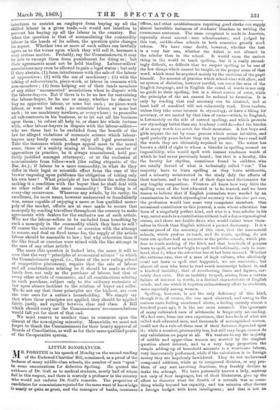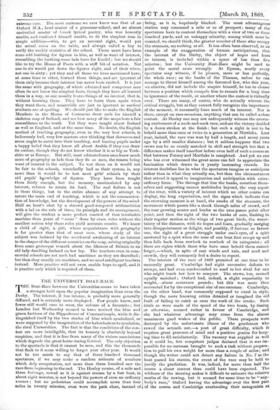LITTLE IGNORANCES.
ju-R. FORSTER in his speech of Monday on the second reading 131. of the Endowed Charities' Bill, mentioned, as a proof of the badness of many middle-class schools, the number of men "spun" in some examinations far defective Spelling. He quoted the evidence of Dr. Gall as to medical students, nearly half of whom fail in this respect, and there is scarcely a professor in the country who would not endorse Dr. Gull's remarks. The proportion of candidates for commissions rejected for the same want of knowledge is nearly or quite as great, and the managers of banks, insurance
offices, and other establishments requiring good clerks can supply. almost incredible instances of students' blunders in writing the
commonest sentences. The same complaint is made in America, especially about second rate schoolmasters; and judged by this test, middle-class schools in both countries greatly need reform. We have sonic doubt, however, whether the test is a very fair one, whether the defect is not oftener in
the scholar than in the school. It would seem the easiest
thing in the world to teach spelling, but it is really exceedingly difficult, so difficult that we suspect spelling to be one of
the few things which cannot be taught, in the proper sense of that word, which must be acquired mainly by the exertions of the pupil himself. No amount of practice which school-time will allow, and
no system of dictation, however careful, can cover the area of the English language, and in English the sound of worth is not only no guide to their spelling, but is a direct source of error, while
the principles of the art cannot be reduced to formulas. It is only by reading that real accuracy can be attained, and at least half of mankind will not voluntarily read. Even readers,
unless they take some interest in etymology, or have a liking for accuracy, or are moved by that idea of caste—which, in England, is fortunately on the side of correct spelling, and which protects our etymology better than any Academy could do—find the burden,
of so many words too much for their memories. A few boys and girls acquire the art by some process which seems intuitive, and spell perfectly years before they can by possibility have read half the words they are ultimately required to use. The writer has known a child of eight to whom a blunder in spelling seemed an impossibility, who would spell with instant readiness words of
which he had never previously heard ; but that is a faculty, like the faculty for rhythm, sometimes found iu children who
are totally devoid of what is technically called " ear." The majority have to learn spelling as they learn arithmetic, and a minority uninterested in the study defy the efforts of their teachers, and to the end of their days need dictionaries for
any lengthy composition. Printers all know how 'very little the spelling even of the best educated is to be trusted, and we have reason to believe that if English journalists were weeded by an examination in which etymological accuracy was the sine qua non, the profession would lose some very competent members. One occasional contributor to this journal, a man whose education has been of a singularly perfect kind, and who is a true scholar in his
way, never sends in a contribution without half a dozen etymological errors, au :I there are double-firsts who would rather trust them
selves in Greek than English without a pocket dictionary. It is a curious proof of the accuracy of this view, that the commercial schools, which profess to teach, and do teach, spelling, do not turn out spellers half as accurate as the public schools, which pre: fess to teach nothing of the kind, and that hundreds of persona
learn to spell, or rather begin to spell well habitually, only iu manhood, that is, when the attention has at last been aroused. Whether
the extreme case, that of a man of high culture, who absolutely could not learn to spell ever happened, we are uncertain ; but almost all men who have to read much manuscript believe it, and a kindred inability, that of recollecting dates and figures, certainly does exist. But an inability to spell, arising from a certain failure of interest in words, is a distinct characteristic of English minds, and one which it requires extraordinary effort to eradicate, more especially among women.
Spelling, however, is not the only deficiency of this kind, though it is, of course, the one most observed, and owing to the curious caste feeling mentioned above, a feeling entirely absent a
hundred years ago, it is the one most resented. The ignorance of many cultivated men of arithmetic is frequently astounding.
We feel sure, from our own experience, that hundreds of what are called well-educated men, and thousands of accomplished women, could not do a rule-of-three sum if their fortunes depended upon
it; while a number, presumably less, but still very large, cannot do any calculation on paper at all. We venture to say the majority of middle and upper-class women are worried by the simplest
question about interest, and to a very largo proportion the simple adding-up of household accounts is a wearisome labour, very inaccurately performed, while if the calculation is in foreign money they are hopelessly bewildered. They do not understand
compound addition, while as to compound division, or any problem of any sort involving fractions, they frankly decline to make the attempt. We have personally known a lady, mistreats
not only of four languages, but of their literatures, give up the effort to discover what the fourth of a seventh was as some
thing wholly beyond her capacity, and ten minutes after discuss a foreign budget with keen intelligence ; and that is not an extreme case. The most extreme we ever knew was that of an Oxford M.A., head master of a grammar-school, and an almost unrivalled master of Greek lyrical poetry, who was honestly unable, and confessed himself unable, to do the simplest sum in simple addition—who, to get an account right, would put the actual coins on the table, and always called a boy to verify the weekly statistics of the school. There must have been some odd loathing for figures in him, as well as want of interest, resembling the loathing some lads have for Euclid ; but we should like to try the House of Peers with a stiff bit of notation. Not one in six would put down the figures right, and of their wives, not one in sixty ; yet they and all those we have mentioned have, at some time or other, learned these things, and are ignorant of them only because their interest has never been excited. It is just the same with geography, of which educated and competent men often do not know the simplest facts, though they have all learned them in a way, as one usually learns things of no interest, that is, without learning them. They have to learn them again when they want them, and meanwhile are just as ignorant as medical students are of spelling. We should just like to make the English Members in the House of Commons draw each for himself a skeleton map of Ireland, and see how many of the maps bore a fair resemblance to the truth. Yet they were taught about Ireland as well as England, and at the same time. No doubt, the English method of teaching geography, even in the very best schools, is ludicrously bad, very few masters ever thinking that distances and areas ought to enter into their teaching, and leaving pupils under a happy belief that they know all about Arabia if they can draw its outline, though they do not know whether it is as big as Yorkshire or as Europe. But still, most educated men once knew much more of geography as lads than they do as men, the reason being want of interest in the subject. To test them on it would not be fair to the schools, wretchedly bad as their system is, any more than it would be to test most girls' schools by their old pupils' knowledge of figures. They have been taught them fairly enough, but the memory, unstimulated by any interest, refuses to retain its load. The real failure is not in these things, but in the entire absence of any attempt to secure the main end of teaching, which is not the communication of knowledge, but the development of the powers of the mind. Half an hour's chat by a shrewd good-tempered arithmetician with a lad on the rule of three, its principle and its management, will give the student a more perfect control of that iuvaluable machine than years of "sums " done by cram rules without the smallest notion why those rules yield accurate results. We know a child of eight, a girl, whose acquaintance with geography is far greater than that of most men, whose study of the subject was induced by the accidental awakening of an interest in the shapes of the different countries on the map, arising originally from some grotesque remark about the likeness of Britain to an old lady dandling Ireland on her lap. The teachers even in commercial schools are not such bad machines as they are described ; but then they usually are machines, and we need intelligent teachers instead. Mere practice will not even enable boys to spell, and it is practice only which is required of them.



































 Previous page
Previous page